Your skin is your body’s largest organ, and it serves as the protective barrier between your internal organs and the outside world. Not only does your skin shield you from harmful elements, but it also plays a vital role in regulating body temperature and maintaining overall health. To achieve radiant and healthy skin, it’s essential to adopt a comprehensive approach that combines proper skin care, a balanced diet, hydration, and lifestyle choices. This blog will explore the best foods for skin health and provide valuable tips to help you achieve glowing and youthful-looking skin.
What Is Skin Health?
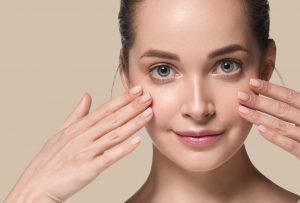
Skin Health refers to the overall well-being and condition of the skin, which is the largest organ in the human body. Healthy skin is essential for protecting the body from external factors, regulating temperature, and preventing infection.
It also plays a crucial role in physical appearance, impacting self-esteem and confidence.
Several factors help in maintaining skin health:
- Proper hydration
- Good nutrition
- Sun protection
- Cleansing
- Regular checkups
Factors Influencing Skin Health:

Skin health is influenced by a variety of internal and external factors. Understanding these factors can help you make informed choices to maintain and improve your skin’s appearance and overall health.
Here are the key factors that affect skin health:
- Age
- Sun Exposure
- Skincare Habits
- Diet and Nutrition
- Hydration
- Sleep and Stress
- Smoking and Alcohol Consumption
- Hormonal Changes
- Environmental Factors
- Genetics
- Medications and Medical Conditions
- Skincare Products and Treatments
Lifestyle Changes To Improve Skin Health:

Here are some lifestyle changes you can incorporate to promote healthy, radiant skin:
- Protect Your Skin from the Sun
- Adopt a Consistent Skincare Routine
- Eat a Balanced Diet
- Stay Hydrated
- Get Enough Sleep
- Manage Stress
- Quit Smoking and Limit Alcohol
- Exercise Regularly
- Avoid Harsh Skincare Products
- Seek Professional Guidance
- Limit Sugar and Processed Foods
- Practice Good Hygiene
Best Foods For Skin Health:
The list can be inexhaustible but for the starters, here are the 12 best foods for skin health:
Fatty Fish:
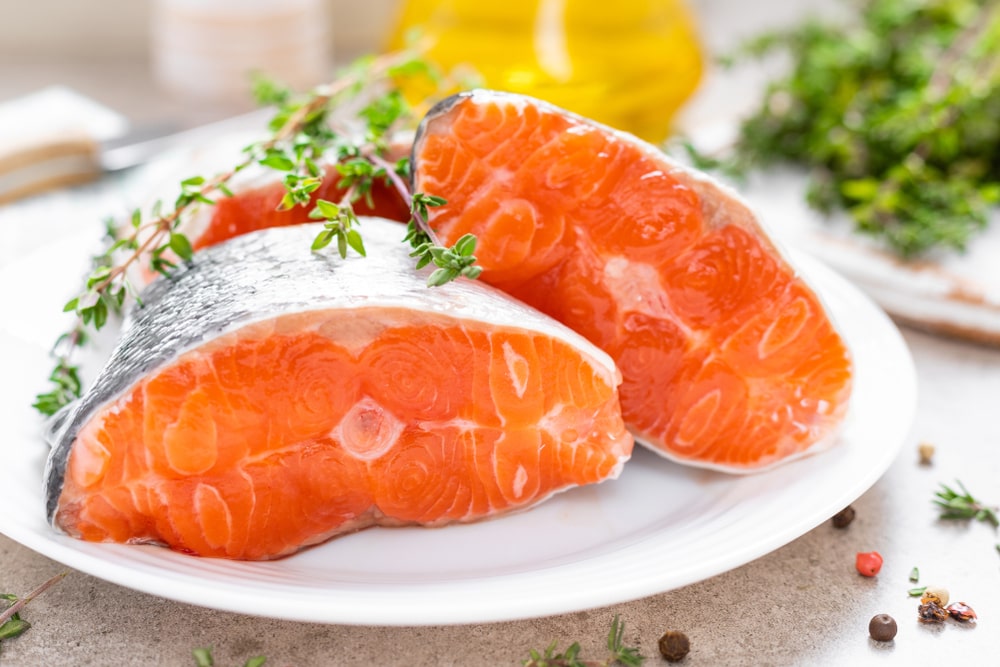
Fatty fish like salmon, mackerel, and sardines are rich in omega-3 fatty acids. Omega-3s help moisturize skin, reduce inflammation, and support a healthy skin barrier. Examples of fatty fish rich in omega-3 fatty acids include salmon, mackerel, sardines, herring, and trout.
Incorporating these types of fish into your diet can provide you with the benefits of omega-3 fatty acids for skin health. However, it’s important to note that a balanced diet with a variety of nutrients, including vitamins, minerals, and antioxidants, is essential for overall skin health.
As with any dietary changes, it’s a good idea to consult with a healthcare professional or a registered dietitian before making significant changes to your diet, especially if you have specific health conditions or concerns.
Avocado:

Avocados are a great source of healthy fats, including monounsaturated fats, which nourish the skin and improve its elasticity.
They also contain vitamins C and E, antioxidants that protect the skin from oxidative damage.
To reap the potential skin benefits of avocado, you can include it in your diet by adding slices to salads, spreading it on whole grain toast, or blending it into smoothies.
You can also use mashed avocado as a natural facial mask by applying it to your skin for a moisturizing and nourishing treatment.
Nuts and Seeds:
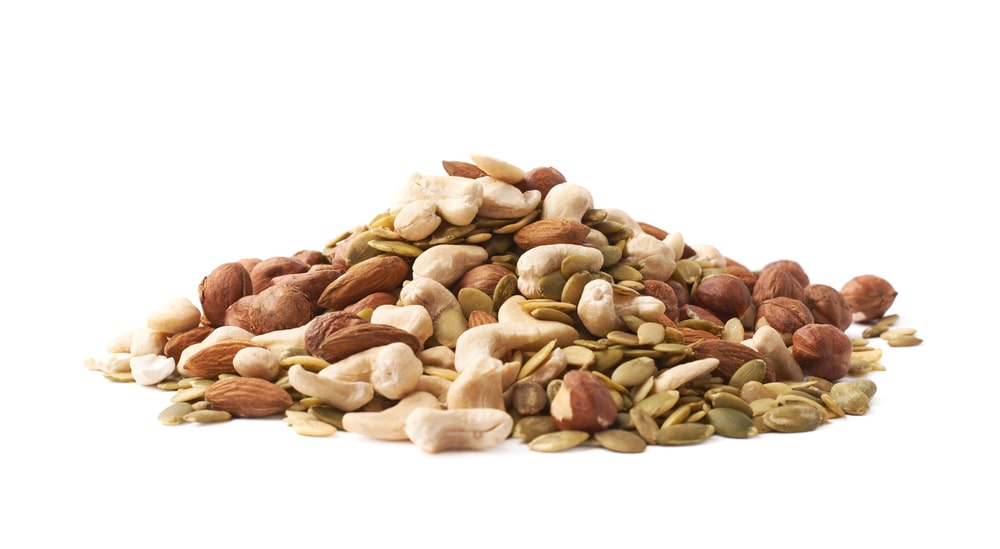
Almonds, walnuts, chia seeds, and flaxseeds provide a variety of nutrients for skin health, including vitamin E, zinc, and essential fatty acids.
Including a variety of nuts in your diet can provide a range of nutrients that support skin health.
Nuts can be enjoyed as snacks, added to salads or yogurt, used in cooking, or blended into smoothies.
However, since nuts are calorie-dense, it’s important to consume them in moderation to avoid excessive calorie intake.
Sweet Potatoes:

Sweet potatoes are rich in beta-carotene, a precursor of vitamin A. Vitamin A is crucial for maintaining healthy skin, promoting cell turnover, and supporting a radiant complexion.
To include sweet potatoes in your diet, you can bake, steam, boil, or even mash them. You can also use sweet potatoes in various recipes, from soups and stews to salads and side dishes.
It’s important to remember that while individual foods like sweet potatoes can contribute to skin health, an overall balanced diet rich in a variety of nutrients is key for promoting optimal skin and overall well-being.
If you have specific skin concerns or dietary needs, consider consulting a healthcare professional or registered dietitian for personalized guidance.
Citrus Fruits:
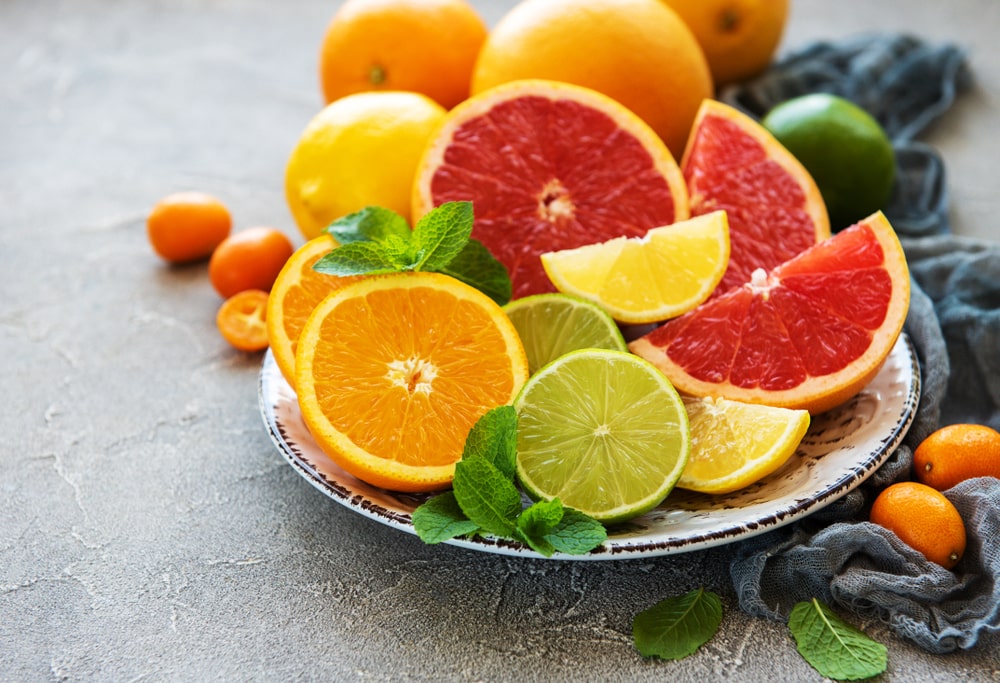
Oranges, lemons, grapefruits, and other citrus fruits are high in vitamin C, a potent antioxidant that boosts collagen production, reduces skin aging, and helps repair damaged skin cells.
Incorporating citrus fruits into your diet is relatively easy, as they can be enjoyed in various ways, including eating them fresh, juicing, adding slices to water or salads, and using their zest as a flavor enhancer.
However, be mindful of individual sensitivities, as the acidity of citrus fruits may trigger reactions in some people, particularly those with sensitive skin or acid reflux.
Berries:

Blueberries, strawberries, and other berries contain antioxidants, such as anthocyanins and vitamin C, that protect the skin from free radicals and promote a youthful appearance.
To incorporate berries into your diet, you can enjoy them fresh, add them to yogurt or oatmeal, blend them into smoothies, or use them as toppings for various dishes.
Keep in mind that the benefits of berries are part of an overall balanced diet and skincare routine.
If you have specific skin concerns or dietary needs, consider consulting a healthcare professional or dermatologist for personalized guidance.
Green Leafy Vegetables:
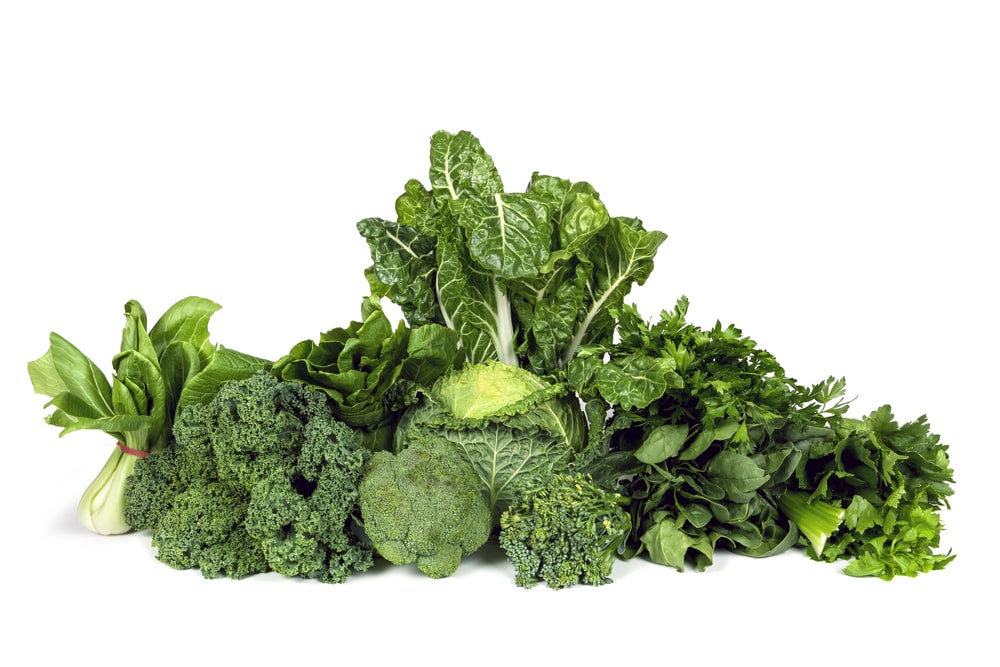
Spinach, kale, and other leafy greens are excellent sources of vitamins A, C, and K, as well as antioxidants like lutein and zeaxanthin, which contribute to healthy, glowing skin.
Spinach and other leafy greens are packed full of a variety of nutrients that help improve the appearance of your skin. For example, Vitamin A is an antioxidant that eliminates free radicals from your skin cells.
A balanced diet always contains leafy vegetables that make it up for skin health. It can be salads, smoothies, stir-fries, and cooked meals.
Tomatoes:

Tomatoes are rich in lycopene, a powerful antioxidant that helps protect the skin from sun damage and improves skin texture. Tomatoes are one of the best sources of lycopene, a powerful antioxidant that gives them their red color.
Lycopene is known for its potential to protect the skin from UV damage and oxidative stress caused by free radicals. It can contribute to reducing the risk of sunburn and premature aging caused by sun exposure.
Along with lycopene, tomatoes contain other antioxidants such as vitamin C and vitamin E, which help neutralize free radicals and protect the skin against environmental damage.
Bell Peppers:
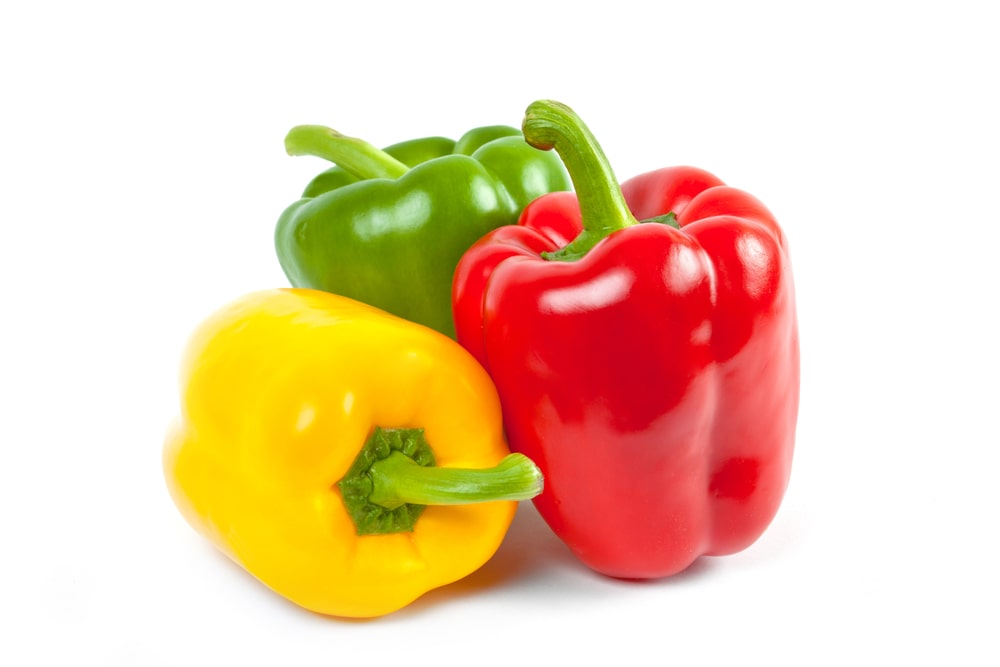
Bell peppers are particularly high in vitamin C, which is a potent antioxidant that supports collagen synthesis, promotes wound healing, and helps protect the skin from oxidative stress and UV damage.
Collagen is essential for maintaining skin firmness and elasticity. The combination of vitamin C and antioxidants can contribute to a brighter complexion and a more even skin tone.
While not as high in vitamin E as some other foods, bell peppers do contain some of these antioxidants, which contribute to overall skin health.
Broccoli:

Food items such as Broccoli are packed with vitamins C, E, and K, as well as sulforaphane, a compound that helps reduce inflammation and protect the skin from UV damage.
Antioxidant from broccoli helps in clearing the skin. Broccoli contains beta-carotene, a precursor to vitamin A, which plays a role in skin health by supporting cell turnover and renewal.
Broccoli has a high water content, contributing to overall hydration and maintaining skin moisture.
Green Tea:

It contains catechins, which have anti-inflammatory and antioxidant properties. Drinking green tea can help protect the skin from damage and promote a clear complexion. Green tea is rich in catechins, particularly epigallocatechin gallate (EGCG), which are powerful antioxidants.
These antioxidants help protect the skin from oxidative stress caused by free radicals, which can lead to premature aging and skin damage. The polyphenols in green tea have anti-inflammatory effects that can help soothe and reduce redness and irritation in the skin.
Green tea may be beneficial for individuals with inflammatory skin conditions like acne or rosacea.
Dark Chocolate:

It contains high cocoa content and is a source of flavonoids, antioxidants that can improve skin hydration, reduce roughness, and protect against sun damage.
It’s important to note that not all chocolate is created equal.
When considering dark chocolate for its potential skin benefits, aim for options with higher cocoa content (70% or higher) and minimal added sugars.
Keep portion sizes in mind, as excessive consumption can lead to excess calorie intake.
ENDNOTE:
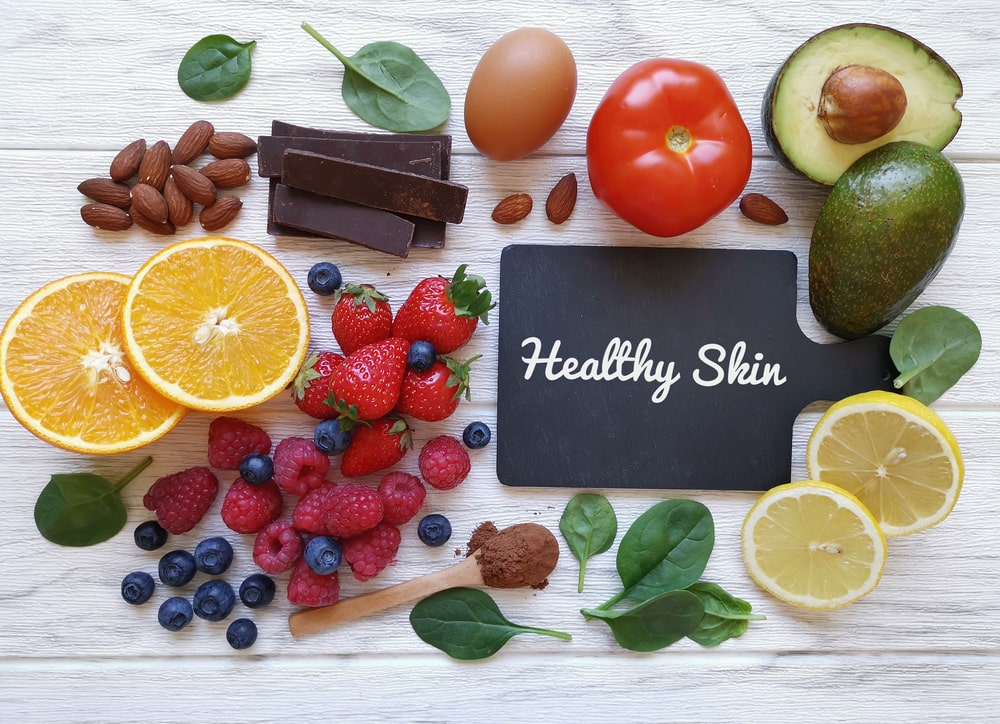
Achieving radiant skin is a holistic journey that requires a combination of proper skincare, a balanced diet, hydration, and a healthy lifestyle.
By adopting a skincare routine suitable for your skin type, nourishing your body with nutrient-rich foods, staying hydrated, managing stress, getting quality sleep, and exercising regularly, you can unlock the secret to glowing and healthy skin.
Embrace these tips as part of your daily routine, and you’ll be rewarded with a radiant complexion that exudes confidence and well-being.
Remember, healthy skin is not just about looking good; it’s a reflection of your overall health and well-being.
FAQs:
Does gut health affect the skin?
According to research, a proper balance of gut microbiota is necessary for optimal skin health, as well as metabolic and immunological homeostasis. More evidence indicates that changes in the makeup of the gut microbiota are associated with the exacerbation of inflammatory skin diseases such as eczema, psoriasis, and others.
What does your skin say about your health?
Skin can notify you of a medical issue. A red, itchy rash could indicate allergies or infections, while a red “Butterfly” rash on your face could indicate lupus. A yellow hue could signify liver illness. Dark or atypical moles may also be a symptom of skin cancer.
What vitamins are best for skin health?
The top vitamin that keeps the skin healthy at its peak is Vitamin D, along with Vitamins C, E, and K. One should make sure to have those vitamins in their diet making the best foods for skin health.
Does liver health affect the skin?
The skin can show signs of both acute and chronic liver disease. The manifestations can be minor, such as early finger clubbing, or more prominent, such as Jaundice.
Are probiotics good for skin health?
Yes, they are extremely good for the skin. Probiotics fall under the best foods for skin health.
References:
- https://www.healthline.com/health/4-best-vitamins-for-skin
- https://www.webmd.com/beauty/nutrients-for-healthy-skin
- https://www.healthline.com/nutrition/12-foods-for-healthy-skin
- https://newsinhealth.nih.gov/2015/11/keep-your-skin-healthy
- https://www.news-medical.net/health/What-is-Healthy-Skin.aspx
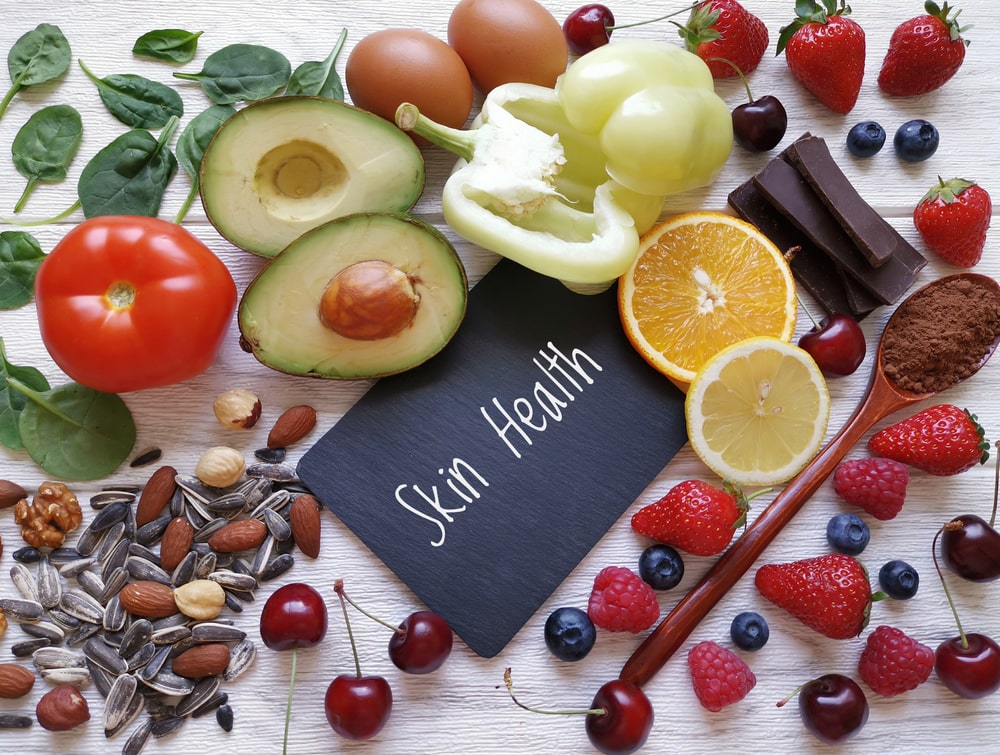


Comments are closed.